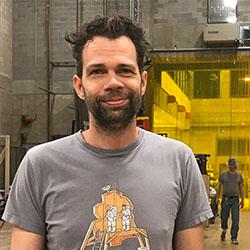
What does your position entail?
I look after three full-time staff members, hire all the students that work in this space, do interviews and all that sort of thing. I also supervise all the curricular students here, so the people who are getting class credit. But what that means is that I spend a lot of time making sure people understand what the shop is working on, why it’s important, how to stay safe, and teaching people the basic skills of how to build things.
What is your favorite part of your job?
We’ve had a few students over the years with no experience with any power tools, or even a hammer. So it’s really satisfying to, in the space of a semester, give people an experience with power tools, welding, and with painting at a really high-level and have them leave with more confidence in their own abilities to learn new things and work in the physical world.
How did you learn how to do all these things?
I’ve been involved in theater in one way or another from a pretty early age. I went to a small liberal arts school in Kansas (under 700 students total) and got an English degree. While I was there, I auditioned for all the plays and was in a lot of them, directed some, and stage managed. But because it was such a small school they always needed help building the scenery and painting the scenery. So I had a faculty member who I worked closely with through all those four years of school and I learned a lot from him. By the time I graduated with my English degree, it was really the easiest way to find a job because that’s what I had skills in. I did a summer of summer stock then a year later I moved down to Austin and started as a temp carpenter in the shop and that was twenty years ago.
Is there a performance here that had a particular impact on you or sticks in your mind?
The production I’m most proud of still, is The Difficulty of Crossing A Field, directed by Luke Leonard in 2010. It was just such an ambitious project put on by a graduate student director. He had to fight so hard to even get it on the season. But he had a whole team of people, other graduate students, the designer in particular, Sonja Rainey, had a really grand vision for it and a lot of technical problems to solve. At that time, we had a technical directing graduate program. And it was just a joy to work with all those people. One of the things I was able to work on was a robotic weevil that walked across the stage at the beginning of the show. And it was a personally important project for me because I worked so hard on that one element and was able to really improve my own skill and contribute to this really excellent production.
Why are the performing arts important to you?
Working with students in the performing arts, there is a place for everybody. You know, I run into people who have other careers, but the moment you tell them you work in theater, they get interested. Not only because they think we have close proximity with famous people or artists that they love, but also because almost all of them had some experience. Like, “Oh I was in a play in high school and it was so much fun,” or “I worked on crew in high school!” and they all have some experience with it.
And performing arts, like all the arts, are such an elemental part of being human. I mean here it’s very complex and technical and stuff but it still gets people excited. We have tours come through all the time and people look around here and are kind of envious for the imagined life we have. I mean, it’s pretty cool, but it’s a lot of hard work too like anything. But my favorite thing about the performing arts, to be succinct, is there is a place for everybody.
What is an interesting fact about yourself?
Because of my experience here, working with students, I have a startup side business that I do called Maker Ready. I have a business partner named Ana Josephson who had a twenty-year career in teaching, and we work primarily with Austin elementary schools to help teachers feel more comfortable making things in the classroom.
A lot of principals and a lot of parents who are interested in maker education want to get this into the classroom as a kind of anecdote to all the standardized tests kids are subjected to. And it’s a lot of fun, but there are many teachers who, just like the students I see here, aren’t comfortable doing those kinds of projects or feel they have to be experts in making stuff before they can teach it. So Ana and I work really hard to go and bring in kits of materials and do projects. We make ridiculous little robot things, but do it in a way with our handbook that makes it very step-by-step so that once they have these basic skills of working with cardboard and working with motors and things like that, then they can expand that and incorporate their own curriculum.
We were hired by a private school in Honolulu and we spent three days with their staff of three or four hundred teachers. It happens to be where Obama graduated from so I got to see the building where Obama started fifth grade. So that was a really big deal for us, being able to get out of state, and not only out of state, but Hawaii, which was really cool.











